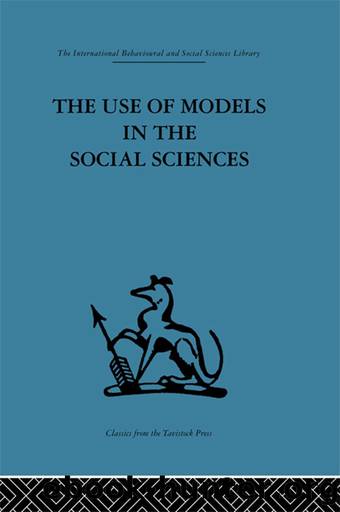The Use of Models in the Social Sciences by Lyndhurst Collins

Author:Lyndhurst Collins [Collins, Lyndhurst]
Language: eng
Format: epub
ISBN: 9781136444890
Barnesnoble:
Goodreads: 19149808
Publisher: Routledge
Published: 2013-11-05T00:00:00+00:00
Integrative and disintegrative social structures in decision-making groups
PETER ABELL
INTRODUCTION
In recent years, much ingenuity has been directed towards understanding collective decision processes; given a set of individuals, each with a clearly defined preference ranking over a set of possible policies, the problem of describing a collective decision, under the imposition of different sorts of decision rules, has been studied both by welfare economists and, more recently, by political scientists. The, by now, classical contribution of Arrow (1951), with his general impossibility theorem, has stimulated many subsequent attempts to get around this apparent paradox. Economists and mathematically oriented social psychologists have paid a great deal of attention to decision-making under risk and uncertainty. The area is one which has, for obvious reasons, attracted the attention of mathematically trained social scientists with the consequence that the theoretical structures are some of the most elegant in social science. However, the empirical success of these various formalistic approaches is something less than satisfactory; when faced with âreal live ongoingâ collective decision processes, empirical complexity is almost invariably far too rich to be caught by relatively simple models. In so far as any empirical success has been forthcoming, it has usually been at the hands of the experimentalist with comparatively simple group experiments in the laboratory situation.
The sociologist interested in collective decision-making in large complex organizations finds little comfort in the available formal models. This is for many reasons, but in general this discomfort arises from âempirical complexityâ ; the salient problems seem to be :
1 In many decision-making contexts there is little reason to suppose that preference rankings are clearly defined or stable over time. This difficulty could be overcome by âlearning theoriesâ and theories of preference dynamics. But the likelihood of developing these sorts of theory, sufficiently rich to embrace the full local complexity residing in each decision-makerâs âconsciousnessâ seems to me, to say the least, remote.
2 It is characteristically the case that decision-making groups face novel situations where established preference patterns are not good predictors. It might be possible to devise preference rankings at a sufficiently abstract level to enable one to embrace apparently novel situations. The sociologistsâ conception of deep-lying value systems should be helpful here, but as far as I know, has not proved so in practice.
3 Decision-making rarely revolves around some well-defined decision rule (e.g. majority rule). The patterns of influence, power (exercised and potential), compromise, âplaying the waiting gameâ, and so on, all influence the process of decision-making.
At the risk of belabouring the obvious â decision-making groups comprise human beings (albeit playing roles) and thus all the idiosyncrasies and nuances for which they are fortunately renowned. The important question is, can one enter a complex ongoing decisionmaking process at a sufficiently abstract level to render it amenable to systematic social science?
In this paper I want to adopt an avowedly sociological approach to the group decision-making process. In so doing, I am not rejecting the more traditional approaches, but merely exploring a rather different line of enquiry. What I want
Download
This site does not store any files on its server. We only index and link to content provided by other sites. Please contact the content providers to delete copyright contents if any and email us, we'll remove relevant links or contents immediately.
| Administration & Medicine Economics | Allied Health Professions |
| Basic Sciences | Dentistry |
| History | Medical Informatics |
| Medicine | Nursing |
| Pharmacology | Psychology |
| Research | Veterinary Medicine |
Machine Learning at Scale with H2O by Gregory Keys | David Whiting(4313)
Fairy Tale by Stephen King(3396)
Will by Will Smith(2919)
Hooked: A Dark, Contemporary Romance (Never After Series) by Emily McIntire(2553)
Rationality by Steven Pinker(2363)
Friends, Lovers, and the Big Terrible Thing by Matthew Perry(2230)
The Becoming by Nora Roberts(2201)
Love on the Brain by Ali Hazelwood(2075)
A Short History of War by Jeremy Black(1848)
HBR's 10 Must Reads 2022 by Harvard Business Review(1843)
The Strength In Our Scars by Bianca Sparacino(1842)
A Game of Thrones (The Illustrated Edition) by George R. R. Martin(1744)
Leviathan Falls (The Expanse Book 9) by James S. A. Corey(1743)
515945210 by Unknown(1666)
Bewilderment by Richard Powers(1620)
443319537 by Unknown(1557)
The 1619 Project by Unknown(1462)
The Real Anthony Fauci: Bill Gates, Big Pharma, and the Global War on Democracy and Public Health (Childrenâs Health Defense) by Robert F. Kennedy(1408)
All About Love: New Visions by bell hooks(1351)
